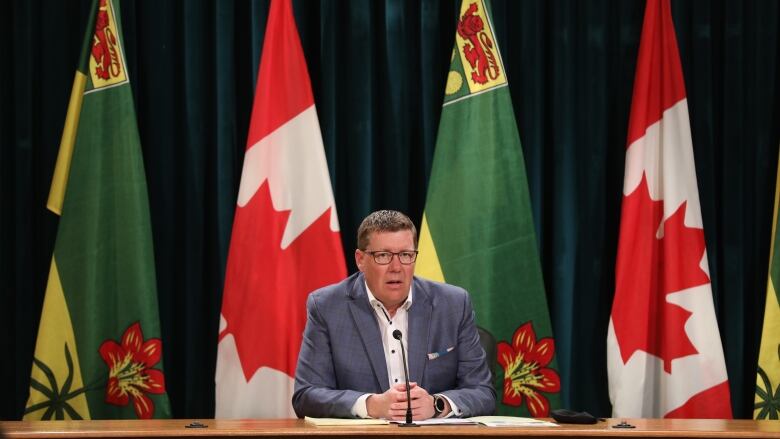Sask.'s political leaders are responsible for unnecessary suffering and death
We are experiencing the tragic consequences of our leaders inaction

This Opinion piece was written by Nazeem Muhajarine,aprofessor of community health and epidemiology at theUniversity of Saskatchewan's college of medicine, and Kathryn Green, a former associate professor of community health and epidemiology at the University of Saskatchewan.
For more information aboutCBC's Opinion section, please see theFAQ.
After 19 months of the COVID-19 pandemic, we have learned much about how to control the spread of the virus tominimizesuffering and death. Sadly for the people of Saskatchewan, our government is ignoring these important lessons and we are experiencing the tragic consequences of our leaders' inaction.
September was a record-setting month for Saskatchewan. These aren't the kinds of records you want to break.
The number of active COVID cases, new daily cases, COVID patients in hospital and ICU patientsall reached new highs. Almost one-fifth of all the cases recorded since the pandemic began came in the past month. Low testing rates mean this is surely an underestimate.
While vaccinations have kept the death rate lower than last winter, Saskatchewan lost 88 of its residents to COVID in September. The health-care system is strained to the point where surgeries for anything not immediately life-threatening have been cancelled, organ transplants are on holdand adults are being treated in the province's only pediatric ICU.
We need to be clear that this suffering, loss of life, stress on health-care workers and disruption of health services could have been prevented.
Other leaders in Canada and elsewhere have learned that the key to controlling the pandemic is to "go early, go hard." Our government must understand that a combination of strategies is required, rather than relying on vaccination alone.
Manitoba much more vigilant
We have only to look to Manitoba, a neighbouringPrairie province also governed by a conservative party, to see how much better off we could have been and to point the way forward.
Manitoba has a slightly larger population than Saskatchewan (1.37 million versus1.17 million) but in the second half of September, our province recorded 5.4 times as many COVID cases and nine times as many deaths. What accounts for this huge difference?
First, more Manitobans have been vaccinated. While some regions have low vaccination rates, overallabout 83 per centof eligible Manitobans are fully vaccinated, compared to just 71 per centin Saskatchewan.
Unlike Saskatchewan's government, Manitoba did not simply rely on asking its residents to do the right thing. Early in June, Manitoba launched a vaccine lottery. In late August, it announced that government workers including health-care workers, teachers, and prison guards must be fully vaccinated by the end of October or undergo regular testing. It implemented a vaccine mandate on Sept. 3, a month ahead of Saskatchewan.

The higher vaccination rate is not the only difference. While Saskatchewan Premier Scott Moe rushed to lift all public health restrictions early in the summer, Manitoba was more cautious.
Manitoba'sindoor masking requirement was not lifted until Aug.7and was reinstated just two weeks later, as the delta-driven fourth wave started to appear in other provinces. Manitoba also continued to restrict the size of public gatherings throughout the summer, while Saskatchewan to this day has no restrictions at all.
Manitoba continues to be forward thinking. In response to increasing case numbers and ICU admissions, the government announced new restrictions effective Oct. 5. Gatherings that include unvaccinated people will be limited in size, as will retail capacity in regions with lower vaccination rates.
Manitoba's public health officials explicitly stated that having learned from the second and third waves of the pandemic, they are not waiting for the situation to worsen before acting.This proactive approach stands in sharp contrast to Saskatchewan's.
On Sept. 29, at his first news conference in more than a month, Health Minister Paul Merriman did not apologize for delaying the implementation of measures to increase vaccination rates.
"There's no looking forward into the future with a crystal ball," he said.
Minister Merriman, like Premier Moe, seems incapable of either hindsight or foresight. Our leaders have the same information and expertise available as provinces like Manitoba. Unfortunately, our leaders appear to believe they are better equipped to make life-and-death decisions than public health and medical professionals.
Reducing further calamity
As winter approaches, no crystal ball is needed to predict what lies ahead if Premier Moe fails to strengthen our province's defences against COVID. To reduce further calamity, we need our government to take leadership and extend the proof-of-vaccination policy to all work settings, especially schools.
Effective strategies such as restricting the size of gatherings, comprehensive contact tracing, and clear expectations around isolation must be brought back, while rapid testing must be scaledup. Transparency and better communication are essential to keep everyone informed and rebuild trust.
Premier Moe has missed the chance to go early, but he can still go hard. By doing so, he could prevent further suffering and unnecessary loss of life in Saskatchewan.
This column is part of CBC'sOpinionsection. For more information about this section, please read thiseditor's blogand ourFAQ.
Interested in writing for us? We accept pitches for opinion and point-of-view pieces from Saskatchewan residents who want to share their thoughts on the news of the day, issues affecting their community or who have a compelling personal story to share. No need to be a professional writer!
Read more about what we're looking for here, then email sask-opinion-grp@cbc.ca with your idea.












_(720p).jpg)


 OFFICIAL HD MUSIC VIDEO.jpg)
.jpg)



























































































